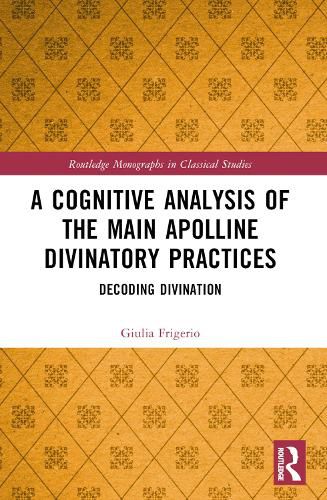Readings Newsletter
Become a Readings Member to make your shopping experience even easier.
Sign in or sign up for free!
You’re not far away from qualifying for FREE standard shipping within Australia
You’ve qualified for FREE standard shipping within Australia
The cart is loading…






This volume takes an innovative interdisciplinary approach to investigating divination procedures at sanctuaries of Apollo in Classical and Hellenistic Greece, merging neuroscience, psychology, and behavioural studies with archaeology.
Through a deep analysis of primary sources and the historical and cultural context of these procedures, Frigerio reconstructs the precise schemata of knowledge and cognitive associations pertaining to ancient visitors of the Oracle, highlighting neural inputs they received inside their minds in these specific situations. The author engages with the archaeological record, studying the cognitive input that both seekers and prophets experienced from features of the outside world such as landscape, architecture, and temperature. This innovative methodology allows for a new understanding of divinatory practices and the formulation of new hypotheses. In addition, this study offers a powerful tool for decoding divination and engaging with the archaeological record in future research.
A Cognitive Analysis of the Main Apolline Divinatory Practices is a fascinating read for students and scholars working on divination and cognition in ancient Greek religion, as well as in religion in the Classical and Hellenistic periods more broadly.
$9.00 standard shipping within Australia
FREE standard shipping within Australia for orders over $100.00
Express & International shipping calculated at checkout
This volume takes an innovative interdisciplinary approach to investigating divination procedures at sanctuaries of Apollo in Classical and Hellenistic Greece, merging neuroscience, psychology, and behavioural studies with archaeology.
Through a deep analysis of primary sources and the historical and cultural context of these procedures, Frigerio reconstructs the precise schemata of knowledge and cognitive associations pertaining to ancient visitors of the Oracle, highlighting neural inputs they received inside their minds in these specific situations. The author engages with the archaeological record, studying the cognitive input that both seekers and prophets experienced from features of the outside world such as landscape, architecture, and temperature. This innovative methodology allows for a new understanding of divinatory practices and the formulation of new hypotheses. In addition, this study offers a powerful tool for decoding divination and engaging with the archaeological record in future research.
A Cognitive Analysis of the Main Apolline Divinatory Practices is a fascinating read for students and scholars working on divination and cognition in ancient Greek religion, as well as in religion in the Classical and Hellenistic periods more broadly.